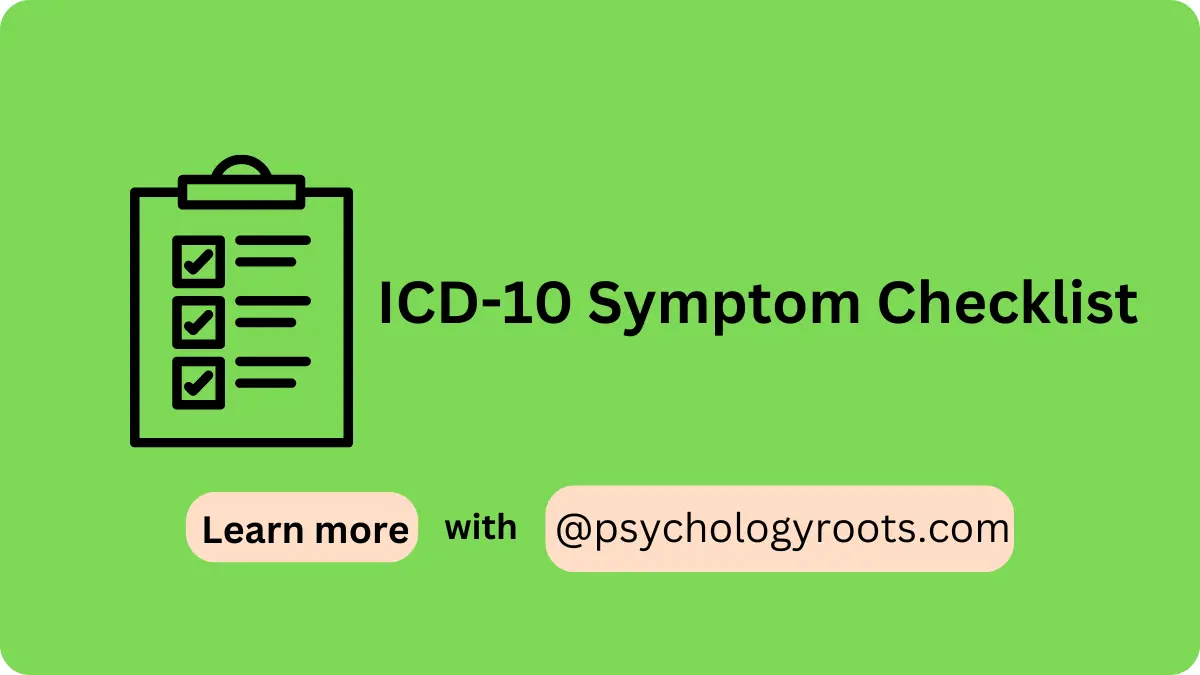Table of Contents
ICD-10 Symptom Checklist
Here in this post, we are sharing the “ICD-10 Symptom Checklist”. You can read psychometric and Author information. We have thousands of Scales and questionnaires in our collection (See Scales and Questionnaires). You can demand us any scale and questionnaires related to psychology through our community, and we will provide you with a short time. Keep visiting Psychology Roots.
About ICD-10 Symptom Checklist
Scale Name
ICD-10 Symptom Checklist
Author Details
A. Janca, T. B. Üstün, T. S. Early and N. Sartorius
Translation Availability
Not Sure

Background/Description
The ICD-10 Symptom Checklist is a comprehensive diagnostic tool designed to align with the ICD-10 Classification of Mental and Behavioral Disorders. It provides a structured method for identifying and recording symptoms associated with various mental health conditions, aiding clinicians in making accurate diagnoses based on internationally recognized standards.
The ICD-10 system is widely used by health professionals worldwide, and the checklist serves as an important supplement to ensure that all relevant diagnostic criteria are considered. The checklist covers symptoms related to mood disorders, anxiety disorders, psychotic disorders, substance use disorders, and more.
The primary purpose of the ICD-10 Symptom Checklist is to provide a standardized way to record and assess symptoms in line with ICD-10 diagnostic categories. This allows clinicians to ensure that all diagnostic criteria are met before reaching a final diagnosis.
Administration, Scoring and Interpretation
- Format: The ICD-10 Symptom Checklist consists of multiple sections, each corresponding to specific categories of mental and behavioral disorders. Clinicians assess the presence and severity of various symptoms according to ICD-10 guidelines.
- Respondents: The checklist is designed for use by clinicians, psychologists, and psychiatrists to evaluate patients presenting with symptoms of mental health disorders. It serves as a structured interview guide or can be used during routine assessments.
Reliability and Validity
The ICD-10 Symptom Checklist has undergone several validation studies, demonstrating its reliability and effectiveness as a companion tool for ICD-10. It is recognized internationally as a standardized method for assessing mental and behavioral disorders, with strong clinical utility in both research and practical settings.
Available Versions
Multiple-Items
Reference
Janca, A., Üstün, T. B., Early, T. S., & Sartorius, N. (1993). The ICD-10 symptom checklist: a companion to the ICD-10 classification of mental and behavioural disorders. Social psychiatry and psychiatric epidemiology, 28, 239-242.
Important Link
Scale File:
Frequently Asked Questions
What is the ICD-10 Symptom Checklist used for?
It is used to assess and record symptoms of mental and behavioral disorders in accordance with the ICD-10 classification system.
Who administers the ICD-10 Symptom Checklist?
It is typically administered by mental health professionals, such as psychiatrists, psychologists, and clinicians.
How is the ICD-10 Symptom Checklist scored?
The checklist uses a Yes/No system to indicate symptom presence, with additional severity ratings for certain disorders.
What are some disorders assessed using the ICD-10 Symptom Checklist?
It covers a wide range of disorders, including mood disorders, psychotic disorders, anxiety disorders, and substance use disorders.
Is the ICD-10 Symptom Checklist widely used?
Yes, it is widely recognized and used in clinical practice and research worldwide, especially in conjunction with ICD-10 diagnostic guidelines.
Disclaimer
Please note that Psychology Roots does not have the right to grant permission for the use of any psychological scales or assessments listed on its website. To use any scale or assessment, you must obtain permission directly from the author or translator of the tool. Psychology Roots provides information about various tools and their administration procedures, but it is your responsibility to obtain proper permissions before using any scale or assessment. If you need further information about an author’s contact details, please submit a query to the Psychology Roots team.
Help Us Improve This Article
Have you discovered an inaccuracy? We put out great effort to give accurate and scientifically trustworthy information to our readers. Please notify us if you discover any typographical or grammatical errors.
Make a comment. We acknowledge and appreciate your efforts.
Share With Us
If you have any scale or any material related to psychology kindly share it with us at psychologyroots@gmail.com. We help others on behalf of you.